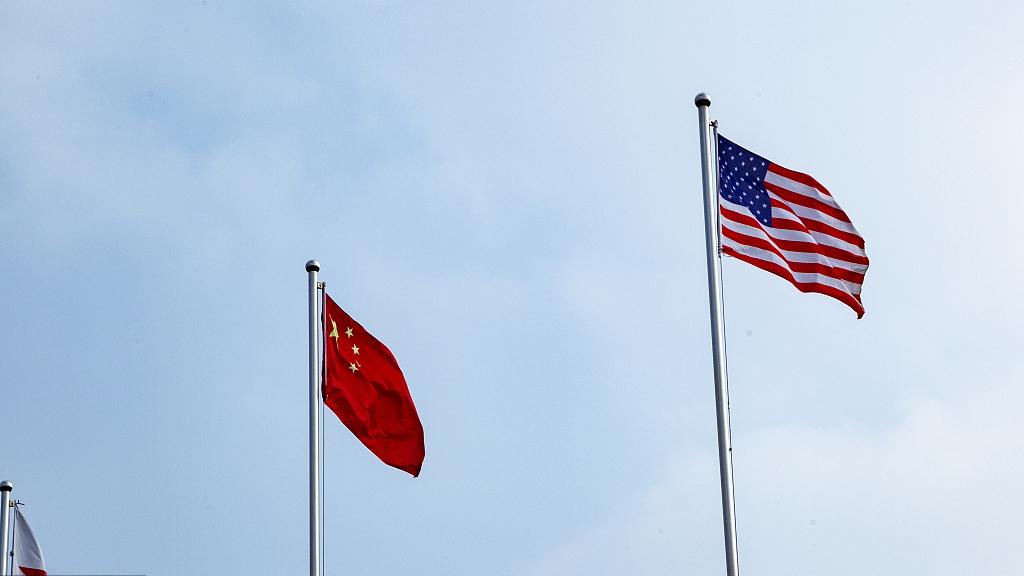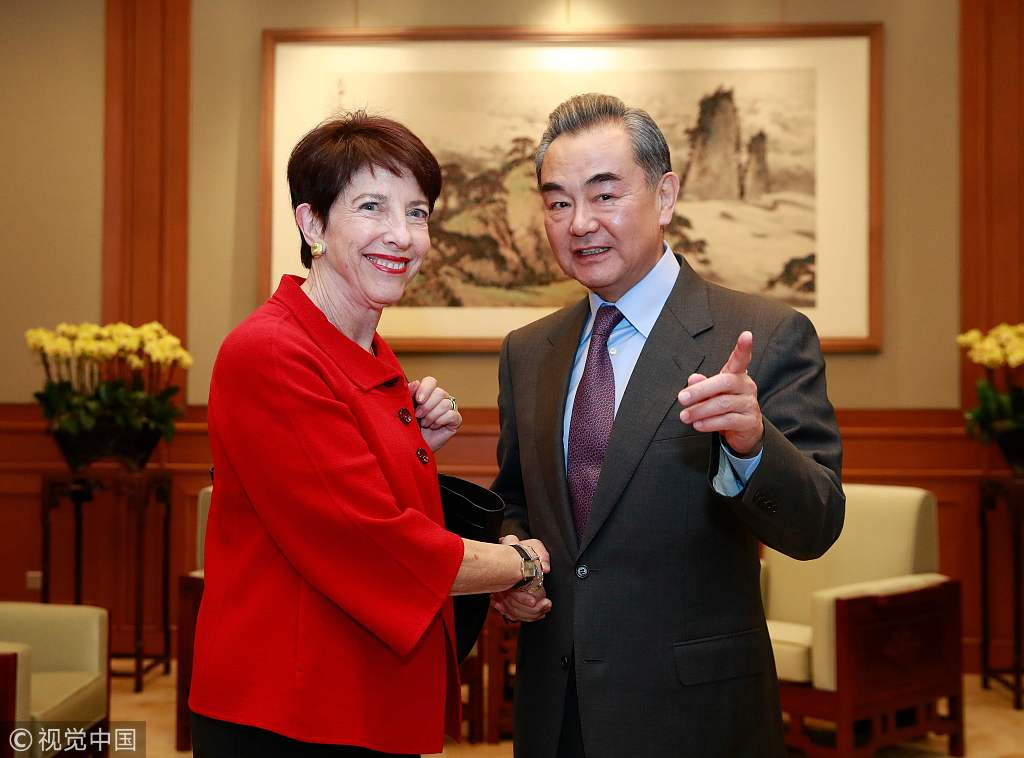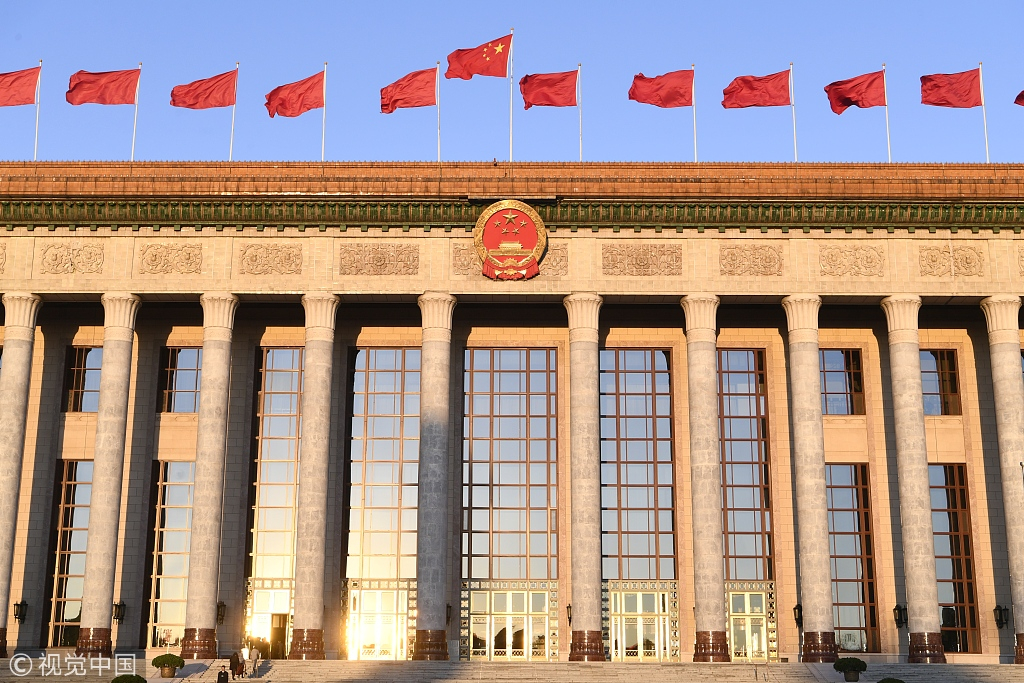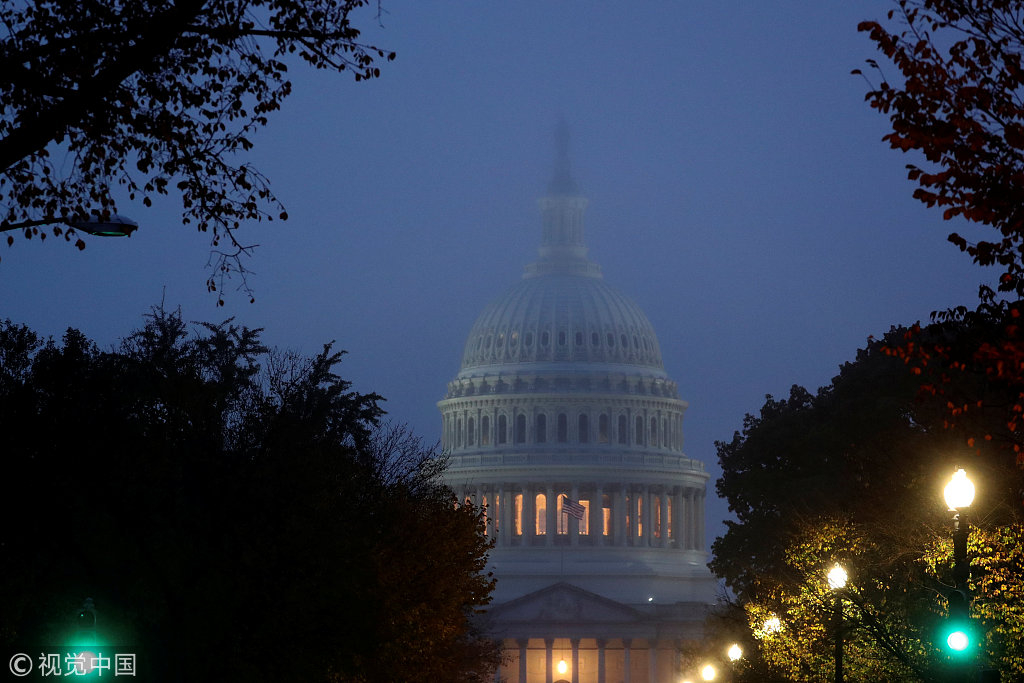
Opinion
18:07, 18-Mar-2019
Can the Policy Report resolve the Sino-U.S. differences?
Meng Weizhan

Editor's Note: Meng Weizhan is an assistant research professor at China Institute of Fudan University in Shanghai, China. The article reflects the author's views, and not necessarily those of CGTN.
The Policy Report, “Course Correction: Toward an Effective and Sustainable China Policy” by Orville Schell and Susan L. Shirk, has recently attracted a wide range of attention in the academic and political circles in both the United States and China.
The views of the report have been praised by many Chinese scholars. Susan Shirk was received by State Councilor Wang Yi in February and has been welcomed in a series of her speeches in China.

Former U.S. deputy assistant secretary of state Susan Shirk (L) shakes hands with China's Foreign Minister Wang Yi (R) ahead of their meeting at the Diaoyutai State Guesthouse in Beijing, February 28, 2019. /VCG Photo
Former U.S. deputy assistant secretary of state Susan Shirk (L) shakes hands with China's Foreign Minister Wang Yi (R) ahead of their meeting at the Diaoyutai State Guesthouse in Beijing, February 28, 2019. /VCG Photo
Today, U.S. political and academic hostility towards China is deepening, and Shirk is worthy of praise for expressing her views relatively objectively in hopes of improving the relations between the two countries.
To avoid making bilateral relations worse, Professor Shirk offers a lot of useful advice with a particular suggestion that the United States should avoid adopting exclusionary policies that irreversibly create a divide between the two economies and societies.
The United States should be aware of the dangers of repeating the mistakes of the McCarthy era by casting unfair suspicion on all ethnic Chinese and others who have close ties with China. In addition, the United States should pursue cooperation with China on global and regional issues.
However, after reading this report, I was disappointed that Shirk essentially did not find the key to resolve the Sino-American differences. She misjudged many aspects of China's current domestic politics. Such miscalculations could cause her advice to resolve the differences between China and the United States to be no more effective than President Trump's policy.
Professor Shirk no doubt knows China's history very well. If she looks back on the history of China in the 20th century, she should know that the Chinese people never stopped pursuing democracy.
The Republic of China was founded in 1911 as the first democratic republic in Asia. Soon afterwards, the Chinese, however, found that cabinet and parliamentary systems led to the weakness of the central government and the division of the country, constantly leaving China subject to foreign bullying.
The Chinese believe that unification and a powerful country are the highest values of pursuit. Ultimately, in 1949, the Chinese chose a different path from the Western world.
Nevertheless, the Chinese government and the people's pursuit of democracy have not stopped. Since the reform and opening-up in 1978, the Communist Party of China has been exploring various forms of a “decentralization” political system, such as the system of separation of power between the party and government in the 1980s and the “collective presidential system” in the 2000s.

The Great Hall of the People, March 15, 2019. /VCG Photo
The Great Hall of the People, March 15, 2019. /VCG Photo
However, these did not prove to be good solutions to China's social problems. Eventually, in 2012, the leadership of the Communist Party of China agreed that recentralization was necessary.
Thus, China's current political system is not the result of one person's choice but the result of constant “trial and error” experiences and practice. American scholars and politicians should judge the effectiveness of a system based on China's development and achievements and not on its conformity with American values.
In her report, Professor Shirk does not offer effective advice to persuade the Chinese to accept American values. She continues to complain about China. Similar to Americans, the Chinese people are also concerned about their democratic rights.
Nevertheless, the Chinese consider unity of the nation the highest political principle. Americans view individual rights as supreme; but the Chinese view national interest as supreme.
This has been the main conviction in China for thousands of years. The United States must first respect Chinese values so that the Chinese can then better understand, learn and accept American values.
However, as no political system is eternally correct, China needs reform of domestic affairs for its own development.
At present, centralization is necessary for China, and it does not hurt America's national interests at all. The ability to exert more influence on world affairs in the future depends on which model is more effective in terms of solving problems.
Currently, the American model does not provide an effective solution; thus, many countries are choosing to learn from China. This should not be the reason for American politicians to blame China or belittle its achievements, but rather introspect the U.S. itself.

Mist shrouds the U.S. Capitol dome on the morning of midterm Election Day, as voters go to the polls to decide the control of the U.S. House and Senate in the mid-term of the Trump presidency in Washington, U.S., November 6, 2018. /VCG Photo
Mist shrouds the U.S. Capitol dome on the morning of midterm Election Day, as voters go to the polls to decide the control of the U.S. House and Senate in the mid-term of the Trump presidency in Washington, U.S., November 6, 2018. /VCG Photo
Finally, Shirk's view is unlikely to win support from the U.S. government. Even if Trump steps down in 2020, the next president will hardly be a supporter of traditional American values. Trump came into power because the mainstream politicians were unable to solve the problems the country is facing today.
Although Shirk may be right, the public does not support mainstream politicians. If Shirk fails to come up with an effective solution to America's domestic problems, it will be difficult for her to come up with a solution to improve Sino-U.S. relations.
There is no denying that the decline of America did not begin in the Trump era but rather in the Bush era and accelerated in the Obama era. Trump is the result of America's decline, not the cause.
In short, although she is a friend of the Chinese people and offers some forthright opinions, Shirk does not give much advice on how to solve the issue of eliminating differences between China and the U.S.
If the U.S. is to strike a balance between short-term economic interests and long-term interest of leadership, American scholars should reflect not only on Trump's mistakes, but also on those of, at least, the last twenty years.
It's clear that the American traditional values have not been accepted by other countries, and gained increasingly less recognition by its own people.
I have no objection to American scholars promoting American values; but such efforts are futile if the United States does not respect the values of other countries.
(If you want to contribute and have specific expertise, please contact us at opinions@cgtn.com.)

SITEMAP
Copyright © 2018 CGTN. Beijing ICP prepared NO.16065310-3
Copyright © 2018 CGTN. Beijing ICP prepared NO.16065310-3